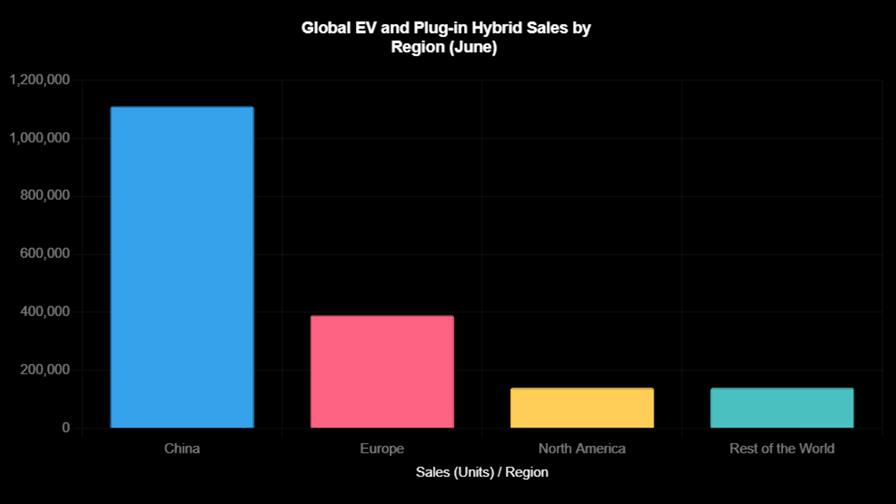Electric Vehicles Sales Soar Globally, Despite U.S. Setback
In a world racing toward a cleaner future, electric vehicles (EVs) and plug-in hybrids are gaining ground at an impressive pace. According to a recent report from market research firm Rho Motion, global sales of these eco-friendly vehicles surged by 24% in June compared to the same month last year, reaching a whopping 1.8 million units. This growth signals a strong shift toward sustainable transportation, driven primarily by robust demand in China and Europe. However, the United States, the world’s second-largest car market, is hitting a speed bump, with sales dipping due to unexpected policy changes.

China, the global leader in EV adoption, saw sales skyrocket by 28% in June, hitting 1.11 million vehicles. This leap reflects the country’s aggressive push for green technology, fueled by government incentives and a growing appetite for affordable electric models. Chinese automaker BYD, in particular, is making waves, not only dominating its home market but also expanding its reach into Europe and emerging markets in Southeast Asia, South America, and Central America.
Europe isn’t far behind, with a 23% sales increase to about 390,000 units. Countries like Germany and Spain are boosting demand through incentives for both individual buyers and fleet operators. The availability of budget-friendly EVs, combined with these subsidies, is expected to keep the momentum going through the second half of 2025. European giants like Volkswagen and Renault are holding strong in the small vehicle segment, but Chinese brands like BYD are steadily carving out a larger slice of the market.
Meanwhile, the “rest of the world” category—covering emerging markets—saw an astonishing 43% surge in sales, surpassing 140,000 vehicles. This growth highlights the increasing accessibility of EVs in regions where demand is just beginning to take off.
In stark contrast, North America, particularly the United States, is facing challenges. EV sales in the U.S. dropped by 1% in June, and the broader North American market, including Canada, saw a 9% decline to just over 140,000 units. For the first time, North America lagged behind the “rest of the world” in EV sales growth. Charles Lester, Rho Motion’s data manager, points to a recent policy shift as the culprit: President Donald Trump’s spending bill unexpectedly slashed tax credits for EVs, dampening consumer enthusiasm.
This setback is significant in a market already grappling with a 25% import tariff on vehicles, which has prompted many global automakers to scale back their 2025 outlooks for the U.S. Without the financial incentives that made EVs more affordable, buyers are hesitating, and sales are projected to struggle for the rest of the year.
The global push for EVs is more than just a trend—it’s a critical step toward reducing carbon emissions and combating climate change. The strong growth in China, Europe, and emerging markets shows that supportive policies and affordable options can drive widespread adoption. However, the U.S.’s stumble highlights how policy changes can disrupt progress. For automakers, the high tariffs and shifting incentives create uncertainty, forcing them to rethink strategies in one of the world’s biggest markets.

The rise of Chinese brands like BYD also signals a shift in the global auto industry. These companies are not only competing with established players like Volkswagen and Renault but are also setting the pace for innovation and affordability. As Lester notes, while some Chinese cities have exhausted their subsidy budgets, more funding is expected in the second half of 2025, which could lead to a “big boost” in sales toward year-end.
Looking ahead, the global EV market shows no signs of slowing down. China’s continued investment in green technology and Europe’s supportive policies are likely to sustain growth. Emerging markets, with their rapid sales increases, are becoming key players in the EV revolution. For the U.S., the path forward is less certain. Restoring incentives or introducing new policies could help regain momentum, but for now, the market remains a laggard.
The numbers tell a clear story: EVs are here to stay, and their global rise is reshaping the auto industry. With 1.8 million vehicles sold in June alone, the world is accelerating toward an electric future. Whether the U.S. can catch up will depend on its ability to navigate policy challenges and embrace the shift to sustainable transportation.
For consumers, the message is simple: EVs are becoming more accessible and affordable, especially in regions with strong government support. As automakers continue to innovate and compete, the dream of a cleaner, greener world is inching closer to reality—one electric vehicle at a time.
Related Post



